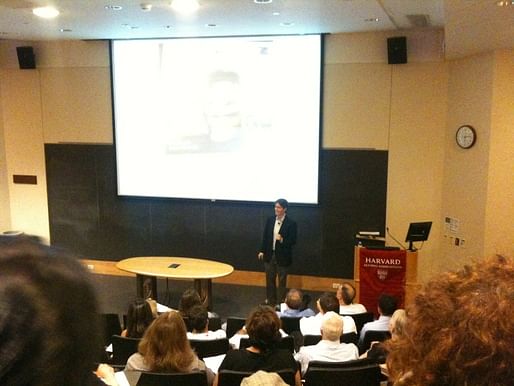
Hi Archinect,
Fair warning: this one isn't architecture. I'm at a Harvard Alumni event--author and marketing, branding, and business strategy expert Dorie Clark is talking about "reinventing yourself." Clark is an alumnus of Harvard's Divinity School.
Clark opens with an anecdote about Joanne Chang, a Harvard mathematics graduate who left her first career to bake cookies. She started by writing letters to all the top chefs in Boston, telling them that her background was in business consulting but that she wanted to cook, and that she was willing to work hard and start at the bottom. All the chefs eventually wrote her back, and she found her way in the industry, founding Myers + Chang and Flour Bakery in the Boston area.
We have lots of connections, but their perceptions of us are 2-3 years out of date; this is a problem.
We think of branding as a "phony" exercise. But (because of social media), we live in a world where it's not really possible to have a "phony" identity anymore--so it's really about discovering your brand.
First, what are people's perceptions of you? A proverb from angel investor Judy Robinett: "If 3 people tell you you're a horse, buy a saddle." Your brand is what other people think it is.
DC's friend, Mary, had a "focus group" in which her friends told her about what her strengths and weaknesses were, and what they thought she should do with her life. We can also get this kind of feedback through a "360. Or, for free: ask five friends to describe you in three words. By the time you reach the fifth person, you'll begin to see patterns.
We make our own opportunities: an anecdote about (yes, another Harvard Business School grad...sorry, it's an alumni event) who decided to get into politics although she had no experience. She started at the bottom, as a volunteer making phone calls, and caught the attention of the campaign and soon started a career as a campaign manager. The message: don't be afraid to temporarily take a step down to move into a new career.
We all know we need mentors! But they're in short supply. Anecdote from Thomas J. DeLong, who found that when he asked a group of people if they'd ever had a great mentor, the people over 40 would raise their hands but the under-40s wouldn't. Is the culture of work changing, in which mentoring isn't valued as much as the bottom line? This is (if I understand correctly) DeLong's theory. [My personal theory would be that we get more grateful as we grow older, and realize who has helped us along the way.]
Hank Phillippi Ryan, investigative reporter and now an author of mystery novels, always wanted to write a novel but had not gotten around to it. At some point her intern asked her to write a romance novel, and she realized that she should go for it. A zen moment: "when the student is ready, the teacher will arrive," even in a surprising form.
Ronald Burt at the University of Chicago, says "make yourself a hub." Every organization has silos. If you are the one who gets out and builds relationships, you'll have access to information that gives you a fresh perspective and you'll become known as a central player.
But what about introverts? Still: Clark has a friend who promised herself to ask someone from a different department to lunch once a week.
Take on leadership roles, even if it is a volunteer role. The social proof of the position opens up opportunities with exponentially greater value.
One of Clark's favorite strategies that she describes in her book is having a wingman. If you constantly brag about yourself, "nobody will like you." If somebody else says those things, "people will think you're fantastic." So find a like-minded friend or colleague and agree to talk each other up.
The internet! Clark wrote a blog post called "If You're Serious About Ideas, Get Serious About Blogging." Her publishing contract for her current book, Reinventing You: Define Your Brand, Imagine Your Future, came from having a blog that a Craigs-lister found when she was scoping her out before buying her bicycle, who put her in touch with the HBR blog, where she eventually was asked to rework an HBR blog post into an HBR magazine piece that was seen by a publisher. The moral of the story is: go for it.
End.
Question from the audience: What does Clark think about Daniel Pink's advice to be able to describe yourself in a tweet or single word? Clark: a single word is a bit short, but yes! It's important to have a narrative.
Question from the audience: What about LinkedIn? Clark: It's a professional necessity these days, but just one part of the story. Don't obsess over it.
Question from the audience: Which social media to focus on? Clark: Blog and use Twitter. Facebook is a mass medium--it's great for sharing pictures with friends and family or reaching general consumers, but decision-makers and leaders are reachable Twitter more than Facebook.
Thanks for reading!
Lian
This blog was most active from 2009-2013. Writing about my experiences and life at Harvard GSD started out as a way for me to process my experiences as an M.Arch.I student, and evolved into a record of the intellectual and cultural life of the Cambridge architecture (and to a lesser extent, design/technology) community, through live-blogs. These days, I work as a data storyteller (and blogger at Littldata.com) in San Francisco, and still post here once in a while.



No Comments
Block this user
Are you sure you want to block this user and hide all related comments throughout the site?
Archinect
This is your first comment on Archinect. Your comment will be visible once approved.